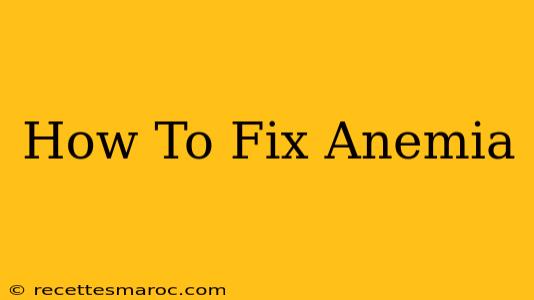Anemia, characterized by a deficiency of red blood cells or hemoglobin, leaves you feeling fatigued, weak, and short of breath. Understanding the root cause is crucial for effective treatment. This comprehensive guide explores various ways to fix anemia and regain your vitality.
Understanding the Types of Anemia
Before diving into treatment, it's vital to identify the type of anemia you have. Different types have different underlying causes and require tailored approaches. Common types include:
- Iron-Deficiency Anemia: The most prevalent type, resulting from insufficient iron intake or absorption. Symptoms include fatigue, weakness, pale skin, and brittle nails.
- Vitamin B12 Deficiency Anemia: Often linked to poor diet, pernicious anemia (an autoimmune disorder affecting B12 absorption), or conditions impacting the digestive tract. Symptoms can mirror iron-deficiency anemia but may also include neurological problems.
- Folic Acid Deficiency Anemia: Similar to B12 deficiency, this type stems from inadequate folate intake or absorption. It's particularly crucial during pregnancy.
- Aplastic Anemia: A rare but serious condition where the bone marrow doesn't produce enough blood cells. It requires immediate medical attention.
- Hemolytic Anemia: This occurs when red blood cells are destroyed faster than the body can replace them. Causes can range from genetic disorders to autoimmune diseases.
- Sickle Cell Anemia: An inherited disorder resulting in abnormal hemoglobin, leading to misshapen red blood cells that block blood flow.
How to Fix Anemia: Treatment Strategies
Treatment for anemia depends heavily on its underlying cause. Your doctor will conduct blood tests to diagnose the type and severity of your anemia before recommending a course of action. However, here are some common approaches:
1. Dietary Changes: The Foundation of Anemia Treatment
Iron-Rich Foods: For iron-deficiency anemia, incorporating iron-rich foods into your diet is paramount. Excellent sources include:
- Lean red meat: A powerhouse of heme iron, which is more easily absorbed than non-heme iron.
- Dark leafy green vegetables: Spinach, kale, and collard greens are rich in non-heme iron.
- Legumes: Lentils, beans, and chickpeas are good sources of both iron and fiber.
- Dried fruits: Apricots, raisins, and prunes are surprisingly high in iron.
- Fortified foods: Many cereals, breads, and pastas are fortified with iron.
Vitamin B12 & Folic Acid Sources: If your anemia is related to B12 or folate deficiency, focus on foods rich in these nutrients:
- Vitamin B12: Found primarily in animal products like meat, poultry, fish, eggs, and dairy. Vegans and vegetarians may need supplements.
- Folic Acid: Abundant in leafy green vegetables, legumes, citrus fruits, and fortified grains.
Improving Iron Absorption: Pairing iron-rich foods with vitamin C enhances absorption. Avoid consuming iron supplements with coffee or tea, as tannins can inhibit absorption.
2. Medication and Supplements
Your doctor might prescribe:
- Iron Supplements: For iron-deficiency anemia, oral iron supplements are commonly prescribed. Intravenous iron may be necessary in severe cases.
- Vitamin B12 Injections or Supplements: For B12 deficiency, injections are often more effective than oral supplements.
- Folic Acid Supplements: Prescribed for folic acid deficiency.
Important Note: Never start taking supplements without consulting your doctor. Incorrect dosage or interaction with other medications can be harmful.
3. Lifestyle Adjustments
Beyond diet and medication, lifestyle changes play a significant role:
- Regular Exercise: Moderate exercise improves circulation and oxygen delivery throughout the body.
- Stress Management: Chronic stress can exacerbate anemia. Practicing stress-reducing techniques like yoga or meditation can help.
- Hydration: Staying well-hydrated is crucial for overall health and helps maintain blood volume.
4. Addressing Underlying Medical Conditions
In some cases, anemia is a symptom of another underlying health issue, such as:
- Celiac disease: A digestive disorder that can interfere with nutrient absorption.
- Inflammatory bowel disease: Chronic inflammation of the digestive tract.
- Chronic kidney disease: Impaired kidney function can affect red blood cell production.
Treating the underlying condition is crucial for resolving the anemia.
When to See a Doctor
If you experience persistent fatigue, weakness, shortness of breath, pale skin, or other symptoms suggestive of anemia, consult your doctor immediately. Early diagnosis and treatment are vital to prevent long-term complications. Don't self-diagnose or self-treat; professional guidance is essential for effective anemia management.

